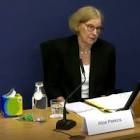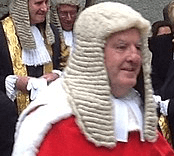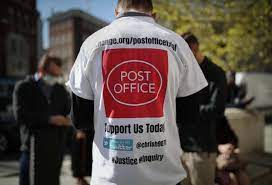- Dark speak easy part one - 18th February 2026
- X marks the spot again - 17th February 2026
- Wordy again part three - 16th February 2026

A former chair of the Post Office (PO) telling a legal inquiry that they were ‘misled’, and how the UK Government wanted to get rid of the woman at the top, throws the spotlight once again firmly on the central role of Wales in the shocking scandal.
Alice Perkins accused unnamed senior executives at the state-owned body of “misleading” its board over problems with the Horizon computer system that led to the largest miscarriage of justice in UK history.

Ms Perkins also told how she was presented with a UK Government business department report from 2014 in which the shareholder executive committee questioned the “suitability” of then Chief Executive Officer (CEO) Paula Vennells.
Her job was “under review“, it said. “There’s a general consensus that Paula is no longer the right person to lead the Post Office”.
The concern centred around the PO’s financial performance but also the feeling that Ms Vennells was “unable to work with personalities who provide a robust challenge to her” and that she did not show “an understanding of political considerations”.

Ms Perkins was chair of the PO from 2011 to 2015, when the problems were emerging, and declared in a witness statement published on Wednesday: “Briefings that we were given by senior executives on Horizon issues were, at critical points, incomplete, ambiguous and sometimes misleading (we were) being provided with inaccurate information by Fujitsu”.
Hundreds of people who owned and operated post offices were wrongly investigated, prosecuted and convicted between 1999 and 2015 because of bugs in the Horizon computer system they operated (or unauthorised access by individuals).

One former sub-postmaster, Chris Head, proclaimed in January: “Lives were destroyed, businesses lost, homes repossessed, bankruptcies, false imprisonment, families destroyed, health issues and suicides, all down to a total cover up of the truth”.
The PO always claimed sub-postmasters’ branch accounts could not be remotely accessed without their knowledge. Yet it is known that executives were made aware as early as 2010 about a secret ‘back door’ access, and in 2015, Ms Vennells wrote a memo to colleagues saying she needed to be able to say: “No, this (the ‘back door’ access) isn’t possible”.

Once it became public knowledge that Fujitsu was able to do this, it undermined every prosecution case and civil claim the PO had brought.
A crucial lieutenant of Ms Vennells’ at the time, Angela van den Bogerd (who lives in Baglan), had earlier told a hearing, with those affected present: “I am truly, truly sorry for the devastation caused to you, your family and friends”.
Even though she was condemned by a judge, Ms van den Bogerd was named as ‘Head of People’ at the Football Association of Wales (FAW). Her arrival led to the abrupt departure of the organisation’s contentious chief at the time, Jonathan Ford, who left losing a vote of no-confidence, following an astonishing civil war, which has never been fully explained by the mainstream media.


Ms van den Bogerd’s appointment came despite the fact that she had been found by a judge to have “obfuscated” and “misled” a court, and she is shown in a television drama about it all, in tears as she reads the judgement.
Ms van den Bogerd was an integral part of the PO’s complaints and mediation scheme, and in 2015 she appeared before MPs at a parliamentary select committee inquiry into the Horizon computer system. She has also co-authored at least one internal PO report on its relationship between sub-postmasters and mistresses, and that system, while in 2018 she was made ‘Business Improvement Director’. Ms van den Bogerd has now departed the FAW as well.

During the hit television series she featured in about the disgraceful events, which was largely filmed in North Wales, she was described as part of “the gruesome twosome!”, along with Ms Venells. The series was called ‘Mr. Bates vs The Post Office‘, and the former postmaster was played by star actor Toby Jones. The drama followed the story of Alan Bates, who along with his wife Suzanne Sercombe, used life savings in 1998 to buy a PO branch in Llandudno.

Mr Bates refused to accept liability like many other sub-postmasters and sub-postmistresses, yet officials terminated their contract with just three months’ notice. It meant the couple lost the £65,000 they had invested.
The Eye’s disclosure of important facts like these, came amid the disturbing news that one sub-postmaster who lived between Swansea and Merthyr Tydfil (along with others) had tried to take his own life, while another Welshman talked about his marriage going on the rocks.

Mark Kelly, who ran the Brondeg Post Office, from 2003 until 2006, has like others described publicly the terrible impact on him, of the wrongful accusation from the PO that he had stolen money. He said that it had “made me feel guilty and depressed, over the years, I started then to blame myself and I tried to end my life a few times”.
But Mr Kelly is not alone in having these suicidal thoughts because of the incorrect allegation.

Another former PO worker, Jennifer O’Dell, said she had also considered killing herself and suffered from recurring night terrors. She had been wrongly accused of stealing almost £10,000 from a post office in Cambridgeshire.
Speaking at the end of the first week of the inquiry, Ms O’Dell said she had researched how to take her own life, and suffered from depression and Post-Traumatic Stress Disorder (PTSD).


The inquiry (led by retired Welsh judge Sir Wyn Williams) was to hear evidence about the design of the defective computer system which made the mistakes (or allowed the unauthorised access), as well as the failings in the investigation.
The Horizon system’s aim was to replace paper in the network of 17,000 branches – however soon after it was rolled out, shortfalls began to appear, often of several thousand pounds. Problems meant it looked like money was missing from branches when it wasn’t.
In all there were 736 unsafe convictions for theft, fraud and false accounting. Ms Vennells has put the blame squarely on Fujitsu, and Mr Bates is depicted in the broadcast finding it depressing as he reads why she had been given the CBE of which she has now been stripped. She was awarded the honour for ‘services to the Post Office’.

Mr Kelly, who was one of those accused between 2000 and 2014, said: “I can’t really socialise as much as I used to and I can’t actually manage some tasks – I can’t handle stress”.
He has described how he went to senior managers at the organisation, believing he had worked out how the errors were happening, but he said the company “didn’t want to know” and wanted to “bury it”.

He eventually resigned, losing the business and then his house, and it meant he and his wife decided not to start a family. He proclaimed: “We originally hoped to keep the office going and we would start a family – it was a four-bedroom house. But after the breakdown, we lost the house from it all, we thought we couldn’t have a family ’cause we had no house and no stability”. Mr Kelly, who now runs a mobile phone repair and accessory shop in Neath Market, hopes his story will “help everyone”.

A further victim of the PO’s tactics, Tim Brentnall, from Roch in Pembrokeshire, said the scandal led to the breakdown of his marriage because of “trust issues”, and he was prosecuted in 2010 after a £22,000 ‘shortfall’ was discovered at his branch, but his conviction was overturned.
Mr Brentnall has told how his sister, who ran a local hotel at the time, was also affected because “people tarred her with the same brush”. And he said in the years that followed his conviction, there was a “whispering campaign”, in the community with people calling him a “thief”and a “fraudster”.

Following the overturning of his convictions, he is now working in the Roch shop again, but said the business would never recover financially with its turnover down from £500,000 to £100,000.
In addition to apologising, the PO has stated: “In addressing the past, our first priority is that full, fair and final compensation is provided and we are making good progress”.
It is unlikely to sound like ‘good progress’ to the victims of this scandal (including those in Wales) when a former chair of the PO claims she and other board members were ‘misled’, and that the UK Government were looking to eject the woman at the centre of it all…

The memories of our Editor, Welshman Phil Parry’s, remarkable decades long award-winning career in journalism as he was gripped by the incurable neurological disabling condition Hereditary Spastic Paraplegia (HSP), have been released in a major book (including looking behind the headlines of important events) ‘A GOOD STORY’. Order the book now!
Regrettably publication of another book, however, was refused, because it was to have included names.









